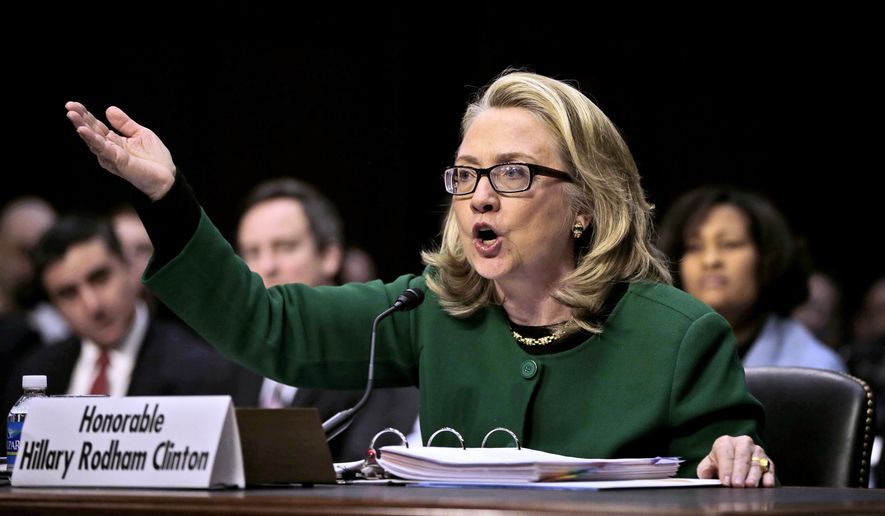The public policy group that forced the Obama administration to cough up emails on the infamous Benghazi “talking points” now wonders whether former Secretary of State Hillary Clinton’s personal emails were improperly withheld.
Judicial Watch, a non-profit watchdog that files law suits to force the government to comply with Freedom of Information (FOIA) requests, obtained emails last year that showed a White House aide pushed the idea that an American-made anti-Muslim video spurred Libyans to attack the U.S. mission in Benghazi in September 2012.
The video explanation was never endorsed by the intelligence community. The attack, which killed the U.S. ambassador to Libya and three other Americans, was shown to be planned and executed by al Qaeda-linked terror groups.
The emails obtained by Judicial Watch did not include any written by Mrs. Clinton. “Talking points” emails previously turned over the Congress also did not contain any written by Mrs. Clinton.
Those emails did, however, include messages authored by senior White House, CIA and State officials, including aides to Mrs. Clinton, as the group struggled to come up with a PR message immediately after the attack.
Judicial Watch President Tom Fitton now wonders whether his group got the full story.
SEE ALSO: Hillary Clinton hidden emails taint Obama transparency vow, boost Benghazi probe
“We are concerned that the Obama administration may have withheld material information and may have purposely misled and lied to Judicial Watch, as well as at least one federal court about these emails,” said Mr. Fitton. “One key concern is that these emails must be immediately secured so that they can be searched in response to our lawful FOIA requests. In addition to violations of the Freedom of Information Act, laws governing the preservation of federal records and the handling of classified information also may be implicated in this latest Clinton scandal.”
In April 2014, Judicial Watch released emails it said solved the mystery of who came up with the video explanation for the attack. The White House at the time was under attack by Republicans for not providing better security at the mission and for a nearby CIA base, which Islamists also attacked, killing two former Navy SEALs.
Judicial Watch said the emails showed that Ben Rhodes, then a White House communications strategist, pushed the message that the attack was “rooted in an Internet video and not a failure of policy.” That, in fact, did become the White House spin.
In January 2013 testimony before the Senate Foreign Relations Committee, Mrs. Clinton said she had no role in drafting the talking points.
“And you know, I wasn’t involved in the talking points process,” she testified. “As I understand it, as I’ve been told, it was a typical interagency process, where staff, including from the State Department, all participated to try to come up with whatever was going to be made publicly available. And it was an intelligence product, and it’s my understanding that the intelligence community is working with appropriate committees to kind of explain the whole process.”
Mr. Fitton said Mrs. Clinton’s private stash of emails while secretary of state cast doubt on whether the Obama administration has compiled with a wide range of FOIA law suits and requests.
PHOTOS: See Obama's biggest White House fails
“The latest news that Hillary Clinton, while serving as Secretary of State, conducted all of her official business on a private account may impact nearly a dozen of our Freedom of Information Act lawsuits now active in federal courts as well as dozens of pending FOIA requests,” he said. “As with what happened when Judicial Watch forced the disclosure of the ’missing’ IRS emails, I am convinced that these emails would never have been disclosed but for our FOIA lawsuits that broke open the Benghazi scandal and first exposed the scandal of her and Bill Clinton raising money illicitly while she was Secretary of State.”
• Rowan Scarborough can be reached at rscarborough@washingtontimes.com.




Please read our comment policy before commenting.